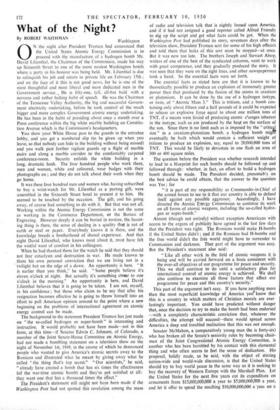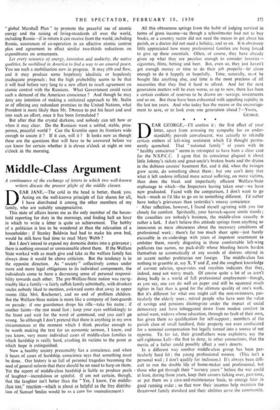What of the Night ?
By ROBERT WAITHMAN • Washington ON the night after President Truman had announced that the United States Atomic Energy Commission is to proceed with the manufacture of a hydrogen bomb Mr. David Lilienthal, the Chairman of the Commission, made his way up Sixteenth Street to one of the more modest Washington hotels where a party in his honour was being held. Mr. Lilienthal is due to relinquish his job and return to private life on February 15th ; and on the face of it this is not good news, for he is one of the most thoughtful and most liberal and most dedicated men in the Government service. , He is fifty-one, tall, all-but bald with a nervous and rather halting habit of speech. He was the Chairman of the Tennessee Valley Authority, the big and successful Govern- ment electricity undertaking, before he took control of the much bigger and more complex Government atomic energy undertaking. He has been in the habit of presiding about once a month over a Press conference within the big white marble building on Constitu- tion Avenue which is the Commission's headquarters.
You show your White House pass to the guards in the entrance lobby, and you get a numbered slip (to be given up when you leave, so that nobody can hide in the building without being missed) and you walk past further vigilant guards up a flight of marble stairs and along a marble corridor to the comfortably carpeted conference-room. Security enfolds the white building in a long, dramatic hush. The four hundred people who work there, men and women, white and coloured, wear badges with their photographs on ; and they do not talk about their work when they go home. .
It was these four hundred men and women who, having subscribed to buy a wrist-watch for Mr. Lilienthal as a parting gift, were assembled in the Sixteenth Street hotel to present it to him. He seemed to be touched by the occasion. The gift, and his going away, of course had something to do with it. But that was not all. Working within the Atomic Energy Commission is not the same as working in the Commerce Department, or the Bureau of Engraving. However deeply it can be buried in routine, the haunt- ing thing is there, the sense of dealing in a quality that is not of earth or steel or paper. Everybody knows it is there, and the knowledge breeds a brotherhood of shared experience. And that night David Lilienthal, who knows most about it, must have felt the wistful want of comfort in his colleagues.
When he had thanked them for the watch he said that they should not fear cataclysm and destruction in war. He made known to them his own personal conviction that we are living not in a - twilight but on the edge of a dawn. An opportunity is here. " It is earlier than you think," he said. " Some people believe it's eleven o'clock at night. But actually it's something closer to one o'clock in the morning." An opportunity is here, and David Lilienthal believes that it is going to be taken. I am not, myself, in his confidence ; but those who claim to be say that after his resignation becomes effective he is going to throw himself into an effort to pull American opinion around to the point where a new beginning on the problems of international agreement on atomic energy control can be made.
The background to the statement President Truman has just made on " the so-called hydrogen or super-bomb " is interesting and instructive. It would probably not have been made—not in this form, at this time—if Senator Edwin C. Johnson, of Colorado, a member of the Joint Senate-House Committee on Atomic Energy, had not made a bumbling statement on a television show on the night of November 1st, 1949, in the course of which he denounced people who wanted to give America's atomic secrets away to the Russians and illustrated what he meant by giving away what he called " the thing that's top secret." " Our scientists," he said, " already have created a bomb that has six times the effectiveness (of the war-time atomic bomb) and they're pot satisfied at all: they want one that has a thousand times the effect."
The President's statement still might not haye been made if the Washington Post had not spotted this revelation among the mass of radio and television talk that is nightly loosed upon America, and if it had not assigned a good reporter called Alfred Friendly to dig up the script and get what facts could be got. When the Washington Post had published its story, seventeen days after the television show, President Truman sent for some of his high officials and told them that leaks of this sort must be stopped—at once.
But it was now too late. The brothers Joseph and Stewart Alsop, writers of one of the best of the syndicated columns, went to work with great competence, and they gradually produced the story. It was seen that they were on the right lines, and other newspapermen took a hand. So the essential facts were set forth.
The essential facts as stated here are that it is known to be theoretically possible to produce an explosion of immensely greater power than that produced by the fission of the atoms in uranium or plutonium. It can be done by the use of a hydrogen isotype, or twin, of " Atomic Mass 3." This is tritium, and a bomb con- taining only about fifteen and a half pounds of it could be expected to release an explosive fo,rce equal to about one million tons of TNT, if a means were found of producing atomic changes inherent in the isotype, such as are produced by the heat i on the surface of the sun. Since there is no limit such as is imposed by the " critic I size " in a uranium-plutonium bomb, a hydrogen bomb migff eventually be built which would contain a sufficient weight of tritium to produce an explosion, say, equal to 20,000,000 tons of TNT. This would be likely to devastate in one flash an area of 300 or 400 square miles.
The question before the President was whether research intended to lead to a blueprint for such bombs should be followed up and followed through: whether, in fact, an effort to build a hydrogen bomb should be made. The President decided, presumaEy on the best advice he could obtain, that the answer to the question was Yes ; for " it is part of my responsibility as Commander-in Chief of the armed forces to see to it that our country is able to defend itself against any possible aggressor. Accordingly, I have directed the Atomic triergy Commission to continue its work on all forms of atomic weapons, including the so-called hydro- gen or super-bomb."
Almost (though not entirely) without exception Americans with access to the organs of publicity have agreed in the last few days that the President was right. The Russians would make H-bombs if the United States didn't ; apd if the Russians had H-bombs and the free world didn't the fret; world might have to surrender to Communism and darkness. That part of the argument was easy. But the President's statement also said: " Like all other work in the field of atomic weapons it is being and will be carried forward on a basis consistent with the over-all objectives of our programme for peace and security. This we shall continue to do until a satisfactory plan for international control of atomic energy is achieved. We shall also continue to examine all those factors that affect our programme for peace and this country's security."
This part of the argument isn't easy. If you have anything more than the most superficial knowledge of America yof know that this is a country to which matters of Christian morals are ever• lastingly important. Yon could have predicted without danger that, once the decision to try to make the bomb had been endorsed —with a completely characteristic conviction that, whatever the difficulties, the attempt will succeed—there would spread across America a deep and troubled realisation that this was not enough.
Senator McMahon, a comparatively young man (he is forty-six) who has broken all the Senate's seniority rules by becoming chair- man of the Joint CongresSional Atomic Energy Committee, is another who has been humbled by his contact with this elemental thing and who often seems to feel the sense of dedication. His proposal, boldly made, as he said, with the object of stirring nation-wide and world-wide discussion, is that the United States should try to buy world peace in the same way as it is seeking to buy the recovery of Western Europe with the Marshall Plan. Let the United States for the next five years cut its expenditure on armaments from $15,000,000,000 a year to $5,000,000,000 a year, and let it offer to spend the resulting $10,000,000,000 a year on a
" global Marshall Plan " to promote the peaceful use of atomic energy and the raising of living-standards all over the world, including Russia—if in return it can receive from the world, including Russia, assurances of co-operation in an effective atomic control plan and agreement to effect similar two-thirds reductions on expenditures on armaments.
Let every resource of energy, invention and audacity, the native qualities, be mobilised in America to find a way to an assured peace. You see such a mobilisation now in progress. It may ebb and flow, and it may produce some hopelessly idealistic or hopelessly inadequate proposals ; but the high probability seems to be that it will lead before very long to a new effort to reach agreement on atomic control with the Russians. What Government could resist such a demand of the American conscience ? And though he may deny any intention of making a unilateral approach to Mr. Stalin or of offering any redundant promises to the United Nations, what President is more likely than Mr. Truman to put his heart and soul into such an effort, once it has been formulated ?
But after that the crystal darkens, and nobody can tell how or when it may clear. Do the Russians want a settled, stable, pros- perous, peaceful world ? Can the Kremlin open its frontiers wide enough to assure it ? If it can, will it ? It looks now as though these are the questions that will have to be answered before we can know for certain whether it is eleven o'clock at night or one o'clock in the morning.



































 Previous page
Previous page